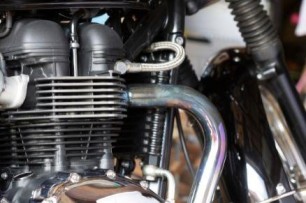Blog Details - Magma HDI

Let's understand why bikes do not have diesel engines 25th February 2021
Diesel engines are commonly used in the automobile sector. Cars, trucks and other vehicles rely heavily on them. On the other hand, diesel-powered bikes are rarely seen. Have you ever wondered why? It's not like the industry hasn't seen diesel-powered motorcycles before. In India, only one diesel-powered bike has been introduced. But that is all.
If bikes can run on gas and petrol, why not diesel? With the petrol prices touching new highs every month, it only makes sense to have bikes with a diesel engine, right?
Although the idea is not bizarre, it isn't easy to execute. Keep reading to know why manufacturers do not use diesel engines in bikes. We have mentioned five reasons that will help you understand better.
1. Compression ratio:
The compression ratio of a diesel engine is 24:1, which is higher than a petrol engine's compression ratio of 11:1. The diesel engine must be bigger and heavier to accommodate such a high compression ratio. As a result, it is heavier than a gasoline engine, making it unsuitable for a small vehicle such as a motorbike.
The diesel-powered engine creates greater vibration and noise than the petrol-powered engine due to the higher compression ratio. A bike will not be able to sustain such high vibrations and noise levels.
2. Heating issues:
As compared to petrol engines, diesel-powered engines generate more heat. When diesel burns, it creates a lot of heat, harming the cylinder walls and other engine components like pistons and valves.
To lower the heat, manufacturers will need a larger surface area and a more effective cooling system which is inconvenient. On the other hand, petrol engines produce less energy per gallon. As a result, they stay significantly cooler and are less prone to harm the engine.
3. Price and Size:
The addition of a turbo compressor to push extra air into the cylinder increases the expense and size of a diesel engine. Moreover, injector technology is utilised to pump fuel into the combustion chamber, which is more costly than petrol engine spark plug technology.
A diesel engine is much larger than a petrol engine, and it requires a lot of force to start, making it unsuitable for motorcycles.
4. Greater torque but low speed:
Diesel engines generate greater torque. However, they have lower revolutions per minute (RPM) when compared to a petrol engine. Diesel isn't regarded as an ideal fuel since bikers' high-performance bikes demand greater RPMs.
5. Not so eco-friendly:
The amount of carbon dioxide produced by a diesel engine is around 13% more per gallon than a petrol-powered engine. Its usage is harmful to the environment, observing the average number of motorcycles used nationwide. This figure can be a significant threat to India's climate.
There you have it, all the key reasons why manufacturers won't produce diesel-powered bikes. Even if we look from a biker's perspective, no biker would want a bulky bike with more cons than pros. Although if the technology evolves in the future, we might have a diesel engine revolution. Until then, stick to your petrol-powered bike and insure it with the best two wheeler insurance in India. You can browse multiple options and choose one with the best premium and benefits.
Click HERE to buy the best two wheeler insurance in India.
Disclaimer: The information provided above is for illustrative purposes only. To get more details, please refer to policy wordings and prospectus before purchasing a policy.

